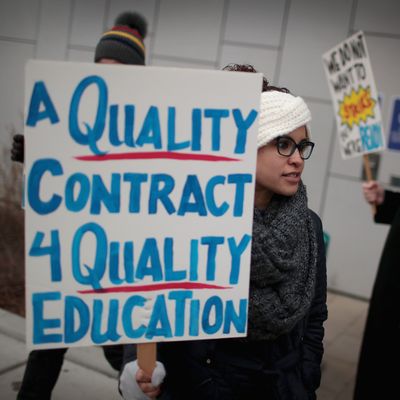
Educators at 15 campuses operated by Acero Charter Schools in Chicago voted to authorize a strike on Tuesday evening. Though some charter educators in Arizona joined peers from traditional public schools in protests at the state capitol earlier this year — part of a larger wave of teacher protests that swept several states — an Acero strike would be the first charter-school strike of its kind in the country.
In a press release, the Chicago Teachers Union reported that 96 percent of unionized Acero educators chose to vote, and of that figure, 98 percent voted to strike. A vote to authorize a strike does not guarantee that Acero educators will actually walk the picket line, but it does tell the charter operator that union members are prepared to do just that if bargaining negotiations continue to stall.
Andy Crooks, who is the president of United Educators for Justice, CTU’s division of unionized Acero educators, told New York on Tuesday that educators had been negotiating with Acero for six months, and saw little movement on the part of the charter operator. “We decided this fall when our membership came back that we were going to work to increase the pressure, to try to get them to move to a more equitable contract,” Crooks added.
Crooks says Acero educators are fighting for equitable pay in addition to an equitable workday and work year. “We work a longer day than our [Chicago Public School] peers, and we’re working a longer school year than our CPS peers,” he said. In a press release, CTU reiterated those concerns, and added, “Acero’s CEO earns more to manage a system of 8,000 students than Chicago Mayor Rahm Emanuel’s CPS CEO receives to manage a district of over 350,000 students, and management fees and non-classroom ‘administrative’ salaries eat heavily into Acero’s budget.”
The union also cites large class sizes, insufficient parental leave, and inequitable pay and promotion schedules for paraprofessionals in particular as key concerns, and asks charters to develop sanctuary policies that would protect undocumented students and families. The union asserts that these problems are particularly egregious because charter schools receive 8 percent more funding per pupil than do traditional public schools. Acero’s CEO, Richard Rodriguez, vigorously disputes that claim, as does the Illinois Network of Charter Schools, which is affiliated with a PAC and a 501(c)4 promoting the charter-school movement in the state. But Rodriguez did recently acknowledge that Acero educators make less than CPS educators on average, and a 2016 analysis produced by the Better Government Association, which describes itself as a nonpartisan and nonprofit news organization, found that during the 2015–2016 school year the city of Chicago had cut funding for traditional public schools, while funding for charter schools remained “virtually untouched.”
In a letter to the editor published in the Chicago Sun-Times on Tuesday evening, INCS president Andy Broy blamed CTU itself for the woes of charter educators. “CTU leaders claim that charter teachers are underpaid, yet CTU has fought legislation that would allow charters to close the wage gap. Complaining about a problem that one created is further evidence that the CTU is not interested in solving a very real resource challenge,” asserted Broy.
Educators in traditional Chicago public schools have been fiercely critical of charter operators; Mayor Rahm Emanuel has repeatedly closed public schools in low-income black and Latinx neighborhoods while funding the expansion of privately operated charter schools. But CTU’s criticism of charter operators doesn’t extend to charter educators: CTU merged with the Chicago Alliance of Charter Teachers and Staff Local 4343, or ChiACTS, in January. For its part, ChiACTS has condemned public-school closures. “Although each of us teaches at a charter school, our union is under no illusion that privatizing public education is a solution,” the union’s executive board announced at the time.
Tuesday’s strike authorization follows years of controversy for the Acero network. Formerly known as UNO Charter Schools Network, Acero rebranded itself in 2017 — not long after it narrowly avoided a strike in October 2016. In 2015, the Chicago Public Schools’ Office of Incubation and Innovation threatened to revoke UNO’s charter for failing to comply with set standards for the education of English learners, and in 2014, the U.S. Securities and Exchange Commission found that UNO “lied to holders of $37.5 million of municipal bonds about conflicts of interest,” as Reuters reported at the time. The SEC charged the network with defrauding investors.
Acero educators won’t be the only Chicago-based charter-school employees to vote on strike authorization this week. Educators at four unionized Chicago International Charter Schools campuses will vote on the possibility of a strike on Friday. The Chicago Sun-Times reported on Tuesday evening that a full strike would affect over 8,000 students at 19 schools.






























